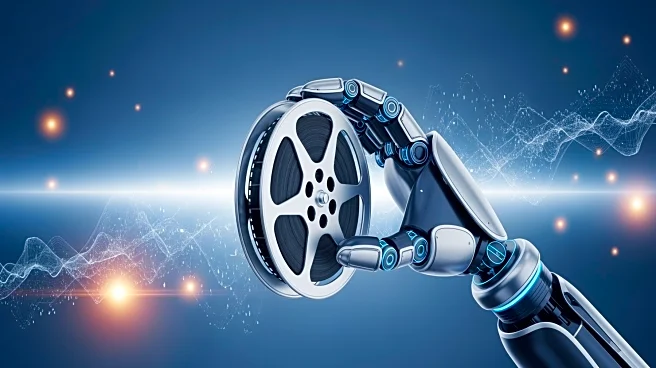What's Happening?
At the Lumière Festival on October 18, 2025, filmmaker Michael Mann announced the use of AI for 'aging and de-aging' in his upcoming film 'Heat 2'. This announcement has sparked significant debate among
directors and casting directors about the implications of AI in filmmaking. Mann confirmed that 'Heat 2' will be released in approximately 4,000 U.S. cinemas with a minimum 45-day run. The use of AI is intended for dramatic purposes rather than gratuitous CGI, according to Mann. This development has raised questions about the future of casting, actor likeness rights, and the potential for AI to replace traditional acting roles.
Why It's Important?
The use of AI in filmmaking, particularly for aging and de-aging actors, represents a potential shift in industry norms. This technology could impact casting decisions, actor contracts, and the overall aesthetic of films. Supporters argue that AI can enhance storytelling by allowing characters to appear consistently over decades, while critics worry about the ethical implications and the potential for AI to replace human actors. The decision by a high-profile director like Michael Mann to use AI in a major release could set a precedent, influencing other studios to adopt similar practices. This could lead to changes in how actors are compensated and how their likenesses are used.
What's Next?
As 'Heat 2' moves forward with its theatrical release, industry stakeholders will be closely monitoring the film's reception and the public's response to AI-enhanced performances. Unions and actors may push for clearer guidelines and protections regarding the use of AI in films. Legal and contractual adjustments are likely as the industry grapples with the implications of this technology. The outcome of 'Heat 2' could influence future productions and the role of AI in Hollywood.
Beyond the Headlines
The ethical and practical implications of AI in filmmaking extend beyond immediate industry concerns. The normalization of AI for de-aging could alter the landscape of storytelling, potentially affecting how audiences perceive authenticity in performances. This shift may also lead to broader discussions about the role of technology in creative industries and the balance between innovation and tradition.











